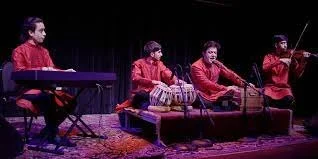How much music do you listen to? Do you wake up to it in the morning? Do you listen to it as you drive? Do you like going to concerts every now and then? The city where I live, Nashville, is not called Music City for nothing; the city is awash in recording studios, live music venues, and singer songwriters practicing their craft even in such places as the farmers' market. Two of our neighbors are recording artists.
Now imagine a life, a country, where music is outlawed.
You'll remember the catastrophic demise of the nation of Afghanistan last year. One year later, where do things stand? The Taliban is still in control, with no perceivable end in sight. And one forbidden fruit under the new regime is listening to, or playing, music.
Parents are not even allowed to sing lullabies to their children.
So you'll understand why a recent NPR story caught my attention: Ahmad Fanoos is a well known singer in Afghanistan and was a judge on the Afghan equivalent of American Idol, called Afghan Star.
Then the Taliban came back to power. At first, Ahmad just stayed at home. Then he received a threatening letter from the Taliban, naming him and his family as infidels because they made music. Ahmad's wife and their 18-year-old violinist son were in India at the time, and son Elham, a classical pianist, was in New York.
Through a series of fortuitous events and contacts, The Fanoos family was able to flee to the US -- that is, all except for Ahmad's wife still in India. Ahmad, however, is still concerned not only about his own band members left behind, but the thousands of musicians like them whose identity and livelihood are bound up with music.
Ahmad and his two sons are now embarking on a US tour under the name "The Heart of Afghanistan", not only treating audiences to their unique blend of traditional Afghan and Western instruments (Elham is a classical piano virtuoso still based in New York. You can listen to his story and a short performance here), but at the same time raising awareness of the plight of that nation's thousands of musicians who are forbidden to practice their craft. The wife and mother is left only to imagine seeing all three of them performing on the same stage, something she has never witnessed.
Hear the NPR story here.
Here's hoping and praying that some ray of musical light will find its way into today's Afghanistan. In the meantime, let's support efforts like this to shine a light on what we take entirely for granted -- the gift of music.

